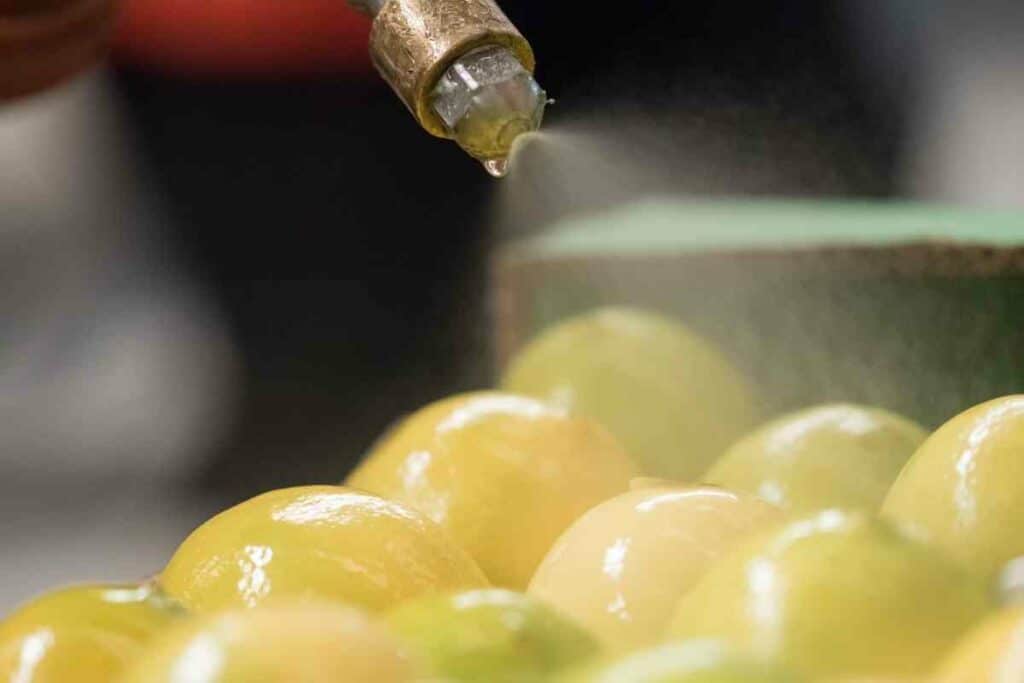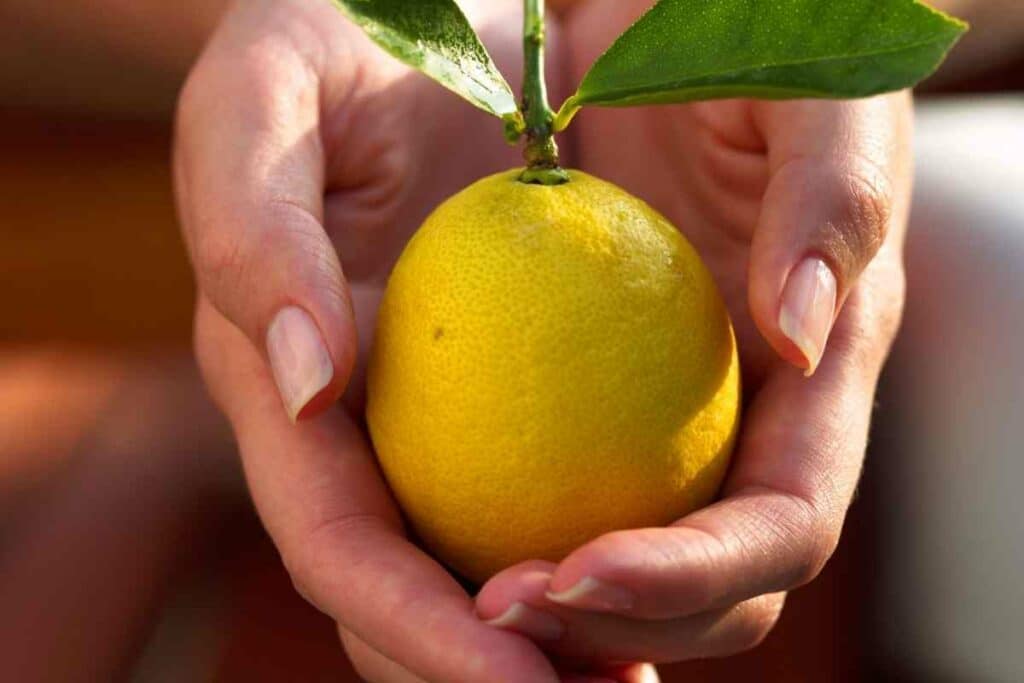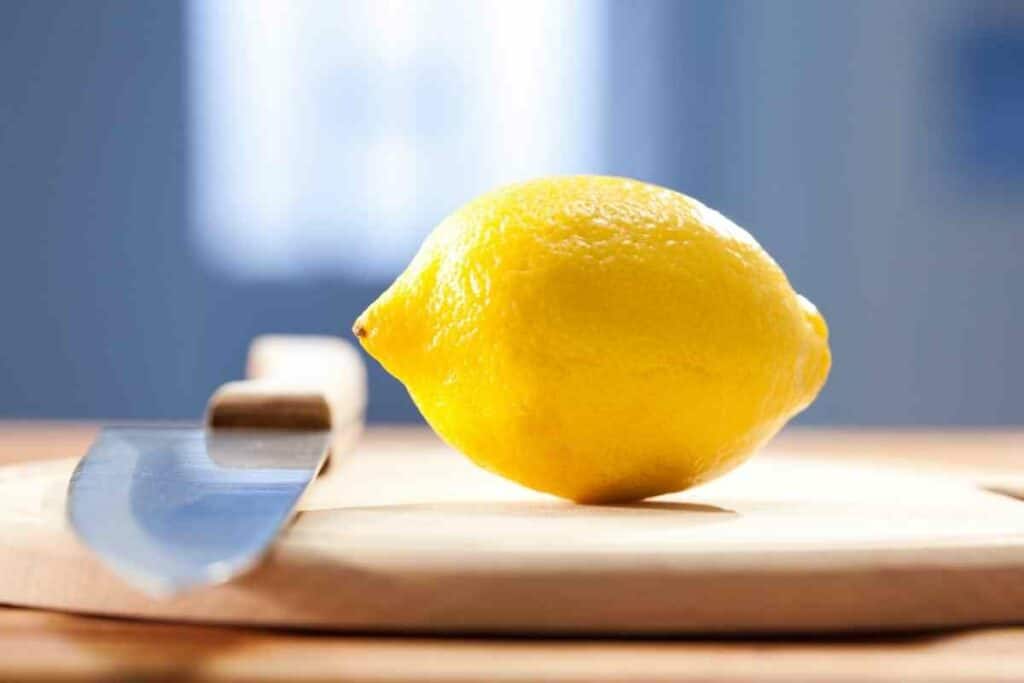Lemons are a perishable item.
This renders them susceptible to quality loss due to factors such as post-harvest water loss and post-harvest rot.
As a result, the wax application plays a significant role in fruit quality preservation.

It is one of the essential post-harvest lemon treatments for preventing undesired alterations that can lower the quality of the lemon.
Waxing is a component of citrus processing. A coat of wax is often applied to both inorganic and organic lemons; Organic lemons typically use a bee wax coating to increase their shelf life which is harmless but the peel doesn’t taste great.
This is done to coat the fruit to protect it in transit, make it seem glossy, and form a protective barrier against moisture loss and dehydration:
- Some are made from polyethylene, a form of plastic.
- Others are made from shellac, which is derived from the secretions of an insect or beeswax.
How Can You Tell If a Lemon Has Been Waxed?
There is no easy way to tell whether a lemon has been waxed.
A lemon that seems less glossy is not necessarily un-waxed, and it is impossible to predict how quickly the coat will come off just on appearances.

Comparing the waxed and the un-waxed lemon, you will notice no meaningful difference in appearance. There is, however, a difference to the touch.
The untreated lemon has a slight waxy residue on the skin when you pull a finger along its surface. The un-waxed lemon leaves no detectable residue.
Also, If you’re attempting to remove wax, keep an untreated lemon on hand to compare outcomes post-dewaxing.
By rubbing a finger or thumb against the lemon surfaces with a sufficient amount of pressure, you may reach by touch.
From Experience: There may be citrus coatings that feel the same before and after de-waxing.
What Is the Importance of Waxing Organic Lemons?
Most lemons are harvested before they are ripe and cleaned, removing any natural covering.
Fruit growers frequently spray the skin of citrus fruits with a thin layer of wax, a process known as artificial waxing.
Anionic micro-emulsions containing resins or waxes are commonly used in synthetic coatings:
- wood rosin
- polyethylene
- carnauba
- beeswax
- shellac
- polyethylene
- and petroleum
Coatings’ principal aim is to prevent weight reduction from fruits, chilling damage, as well as shrinking by reducing respiration and transpiration and improving fruit look by giving shine.
As an environmentally friendly technique, fit for human consumption, coatings and films have been produced.
They provide a semi-permeable barrier to water vapor, carbon dioxide, and oxygen amid the food and the adjacent atmosphere when applied as a layer or placed on the surroundings of a packaged lemon fruit.
This prevents physical damage, microbiological and chemical deterioration, and extends product shelf-life.
Is It Better, to Buy Organic Lemons That Have Been Waxed, or Un-Waxed?
Lemons are frequently waxed to keep the skin fresh and shiny.
This wax is thought to be safe to consume. When stored outside of the refrigerator, the waxing process of lemon can increase its shelf life by approximately three weeks.
A waxed lemon will last for an extended period if chilled. If kept refrigerated, an un-waxed lemon has a shelf life of roughly a week.

If you need the juice, the wax may not bother you, but if you need to zest the lemon, un-waxed is better.
If its juice is needed for cooking, the waxed variety is an alternative. If waxed lemons are your only choice, you may want to de-wax them before starting.
The majority of it may be removed simply by washing the fruit under running water.
Furthermore, it has been established that Imazalil (IMZ) in the wax coating provides improved green mold control in protective treatments.
Green mold control was enhanced with the sole application of IMZ in the wax covering.
Concerns have been raised about the implications of increased coating on fruit quality and whether the wax application and Imazalil (IMZ) residue loading may impair control of green mold or fruit quality.
As a Result: You may conclude that some waxed lemon fruits may be unsafe for human consumption. Although the wax is typically acceptable for human consumption, it’s best to use un-waxed organic wherever feasible.
How to De-wax Organic Lemons
Lemons are frequently waxed to keep the skin fresh and shiny.
Although this wax is deemed safe to consume, if you need to zest the lemon, you may want to de-wax it first.
- Boil water: Fill a saucepan partly with water and bring the water to a boil on the stove over high heat.
- Place the lemons in a sieve: As the water is heating up, arrange the lemons in a sieve, keeping them in a single layer.
- Pour the boiling water over the lemons: The heat of the water will partially melt the wax, freeing it from the peel and making it simpler to remove.
- Scrub the lemons with a vegetable brush: It is essential to use cold running water as you brush gently scrub the outer peel of each lemon.
- Give each lemon a good rinse: To get rid of any remaining wax residue.
- Dry the lemons thoroughly: To dry the peel, gently wipe the peel of each lemon with a clean paper towel. Do not store the lemons while still dry.
Why Are waxed Lemons Cheaper?
Consumers are irritated by frequent faults or diseases that may be detected in waxed lemons due to the excessive application of coatings.
One of the most important elements influencing the price of the lemon is the existence of skin problems.

The presence of frequent flaws or diseases is intolerable for customers, making it one of the most potent variables in fruit pricing.
This results in waxed lemons being sold at a lower price.
Since Un-waxed lemons have a lower shelf life than waxed lemons. They must be sold faster or discarded if they do not sell in time.
Unwaxed lemons are inherently more expensive since they must be replenished regularly.
Final Thoughts
Lemons are waxed to make them seem more appealing, protect them during transportation, and keep them shelf-stable.
The problem with this wax is that it is not necessarily safe. Unwaxed lemons, on the other hand, are frequently more costly since they have a shorter shelf life.
However, if you want to buy un-waxed lemons, organic lemons are your best stake.
Not all un-waxed lemons are organic, but all organic ones are un-waxed.
